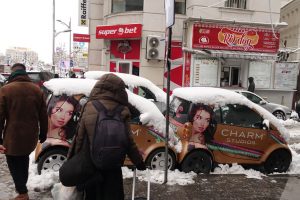9th Bucharest Biennale
Farewell to Research, curated by Henk Slager
Similarly to how Paul Feyerabend once questioned the dominance of rational knowledge in Farewell to Reason, the pioneering Bucharest Biennale will in turn question the dominant trend of academisized research that has reigned now for at least ten years. Could a farewell to such research produce novel forms of articulation while proceeding from the perspective of visual art? Could we formulate a proposition based on a recomposition of three conceptual spaces (creative practice, artistic thinking, curatorial strategies) that intersect when artistic research takes place? These issues will underline the curatorial narrative of the 9th Bucharest Biennale, where an experimental, process-based trajectory will be developed consisting of a series of keynote projects, research labs, performative events, research screenings, curatorial research seminars, symposiums, and publications.
Keynote projects
Tiong Ang & Company’s The 2nd Hands is a complex, performative investigation based on encountering exchange, a journey across European borders, a tribute to freedom of movement, and a constellation of artistic capacities and perspectives. In light of the current situation, the work as a whole—a collective film production by different groups, a road trip, and a congregation in an architectonic construction—can no longer be done in the present timeframe and/or in the right spirit. The cars and caravans that have been purchased remain stagnant. In fact, the entire world seems to be a parking lot today facing the pause that humankind is forced to take. Starting point: parking lot MNAC Bucharest and online platform.
Claudia Braileanu’s project Seamless Affinities explores virtual reality as a tool for modelling novel social configurations. The virtual seems to be anchored in dominant knowledge systems, but at the same time enables social and cultural alternatives in changing perceptions, in imagining future social practices, and in visitors experiencing the unknown and focusing on what could be different. Venue: Creart.
Gustafsson&Haapoja’s videowork Becoming examines emergent ways of how to be human in a world endangered by obsolete conceptions of humanity. In the video, 37 interviewees—artists, activists, children, politicians, teachers, care givers—contemplate phenomena that are in a state of becoming at this very moment. Should those be nurtured in order to attain a more sustainable future? Venue: Auditorium MNAC Bucharest.
Participants in the PhD-in-Practice program at the Academy of Fine Arts Vienna strive for publishing a range of meaningful methodologies of artistic research in deploying concepts capable of bridging and creatively interweaving the realms of the aesthetic and the political. Today’s stories on infection, isolation and the loss of human agency flood our distant screens and occupy our minds and bodies making our work process to act upon us. We are forced to wait until this crip time bends the clock to meet our dispossessed bodies and minds, as Alison Kafer puts it, and reconfigures our methodologies and concepts—unable to determine yet whether that is an obstacle or a chance.
Research lab
At the core of the 9th Bucharest Biennale is an exhibition-in-process, where twenty selected researchers from ten European doctoral programs (University of Bergen, Bucharest National University of the Arts, Hungarian University of Fine Arts, TU Dublin, PXL Hasselt, Uniarts Helsinki, Slade School of Fine Art London, Academy of Fine Arts Prague, Vilnius Academy of Arts, Zurich University of the Arts) participate. They have been invited to develop a proposition (both performative and exhibitionary) which could further articulate the hypothesis and narrative of the biennale. Starting point would be a performative conference (Theatrelli: May 29–31). In line with the presentations and a week of continuous feedback, an experimental logic of display would be realized in the UNAgaleria (June 1–13). However, Covid-19 necessitates an alternative dissemination format. The online publication MaHKUscript will play a crucial role in this process. Participating researchers are: Arnas Askaitis, Erick Beltran, Domenica Cojocoru, Eleanor Duffin, Søren Thilo Funder, Irina Gheorghe, Bernhard Herbardt/Melanie Mohren, Anawana Haloba, Ioana Marinescu, Tomáš Moravec, Eva Mumba, Stephanie Misa, Cornel Moraru, Laura von Niederhausen, Tra Thi Thanh Nguyen, Adrian Preda, Lea Rasovsky, Ingel Vaikla, and Kai Ziegner.
Research screenings
As an extension of a preliminary presentation last December at OnCurating (Zurich), a follow-up program is being processed as an impetus to future research imaginaries. Contributions from: Silvia Amancei & Bogdan Armanu, Ursula Biemann, Henna Halonen, Hristina Ivanovska, Falke Pisano, and Janis Rafa. Venue: National Museum of Romanian Literature (June 15–20).
Curatorial workshop
The curatorial workshop “handfuls thrown into air and scattered over earth” explores the contemporary art exhibition as both an object of study and as site, agent, and mode of knowledge in its own right. Invited speakers: Nick Aikens, Anselm Franke, Catalin Gheorghe, Ola Hassanain, Laima Kreivyte, Steven Henry Madoff, Paul O’Neill, Noura Al Salem, Berit Schuck, and the curators and researchers of Qayyem. Organized in collaboration with Mick Wilson, HDK-Valand, University of Gothenburg. Venue: Online and Goethe Institute (video conference). (June 23–26)
Biennial symposium
The symposium “Contemporary Art Biennials—Our Hegemonic Machines in States of Emergency” addresses content, formats, ideas, and concepts as articulated by the politics of display, specific forms of production and dissemination, and proposed communities and subjectivities. Which forms could we deploy in states of emergency? Participants: Vasyl Cherepanyn, Ekaterina Degot, Patrick Flores, Martin Guinard, Razvan Ion, Ioana Leca, Yung Ma, Oliver Marchart, Shwetal Patel, Farid Rakun, Roma Jam Session Art Kollektiv, Nora Sternfeld, Mirjam Varadinis, Farah Wardani, and Beat Wyss. Organized in collaboration with OnCurating and ZHdK Zurich: Dorothee Richter, Ronald Kolb). Online and Goethe Institute (video conference). (June 27–28).
Proviso
The ultimate implementation of the above program will depend on the state of the Covid-19 pandemic. At the beginning of May, required changes and adjustments will be communicated.


